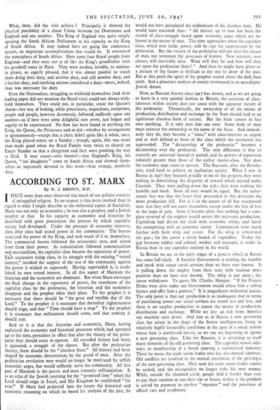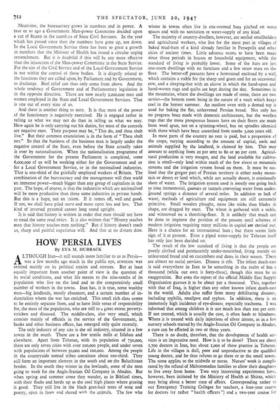ACCORDING TO ST. MARX
By W. J. BROWN, M.P.
1- HAVE more than once observed that much of our politics consists I of misapplied religion. In no respect is this more marked than in regard to what I might describe as the millennial aspect of Socialism. Marx was not only an economist ; he was also a prophet, and a Jewish prophet at that. In his capacity as economist and historian he described with great penetration the process by which capitalist society had developed. Under the pressure of economic interests, class after class had seized power in the community. The barons restricted the power of the King, and took much of it to themselves. The commercial barons followed the aristocratic ones, and seized from them their power. As industrialism followed commercialism and mercantilism, the capitalist class became the repository of power. EaCh successive rising class, in its struggle with the existing " vested interest," invoked the support of the rest of the community against the power it wished to supersede. Having superseded it, it estab- lished its own vested interest. In all this aspect of Marxism the historian and the economist are dominant. But when Marx envisages the final change in the repository of power, the overthrow of the capitalist class by the proletariat, the historian and the economist disappear and the prophet takes their place. To the prophet it is necessary that there should be " the great and terrible day of the Lord." To the prophet it is necessary that thereafter righteousness should reign, and that " Time should have a stop." To the prophet it is necessary that millennium should come, and that coming it should stay.
And so it is that the historian- and economist, Marx, having explained the economic and historical processes which had operated up to his time, postulates in effect that after the victory of the prole- tariat they should cease to operate. All recorded history had been, it appeared, a struggle of the classes. But after the proletarian victory, there should be the "classless State." All history had been shaped by economic determinism, by the greed of men. After the proletarian revolution men would no longer be motivated by selfish economic urges, but would selflessly serve the community. All this part of Marxism is the purest and most romantic millennialism. It is an echo of the Jewish yearning for the " promised time " when the Lord should reign in Israel, and His Kingdom be established "for ever." If Marx had projected into the future the historical and economic reasoning on which he based his analysis of the past, he would not have postulated the millennium of the classless state. He would have reasoned thus : " All history up to now has been the record of class-struggle based upon economic urges which are in- herent in the nature of man. The time approaches when the capitalist ' class, which now holds power, will be ripe for supersession by the proletariat. But the victory of the proletariat will not alter the nature of man, nor terminate the processes of history. New interests, new classes, will inevitably arise. What will they be and how will they act upon the proletarian State? " And then he might have given us a picture of the future as brilliant as the one he drew of the past. But at this point the spirit of the prophet soared above the dull, base earth. And a planetary analysis of society terminated in an apocalyptic Jewish dream.
Now, as Russian history since 1957 has shown, and as we are going to learn in a very painful fashion in Britain, the assertion of class- interests within society does not cease with the apparent victory of the proletariat. Theoretically, the ownership of all the means of production, distribution and exchange by the State should lead to an egalitarian classless form of society. But the State cannot in fact own anything. It is only men that can own. Some body of men must exercise the ownership in the name of the State. And immedi- ately they do, they become a " class," with class-interests as urgent and as well defined as those of the class which the revolution has superseded. The " dictatorship of the proletariat " becomes a dictatorship over the proletariat. The only difference is that its controls are universal instead of partial, and its powers of repression infinitely greater than those of the earlier master-class. Nor does the economic urge cease to operate. The Russians, after the Revolu- tion, tried hard to achieve an egalitarian society. When I was in Russia in 5927 they boasted proudly to me of the progress they were making in diminishing the disparity of reward which existed under Czarism. They were pulling down the rich ; they were exalting the humble and meek. Soon all men would be equal. But the unfor- tunate fact was that the faster they proceeded in this direction the more production fell. For it is in the nature of all but exceptional men that they will not exert themselves except under the fear of loss or the hope of gain. Soon it became plain that nothing but a com- plete reversal of the engines would secure the necessary production. Capitalism had driven the slack with economic whips, and lured the enterprising with an economic carrot. Communism went much further with both whip and carrot. For the whip it substituted the gun ; for the carrot a whole bunch of vegetables. Today the gap between soldier and colonel, worker and manager, is wider in Russia than in any capitalist country in the world.
In Britain we are in the early stages of a process which in Russia has come full circle. A Socialist Government is exalting the humble and meek with vaster social services than we have ever known. It is pulling down the mighty from their seats with taxation more punitive than we have ever known. The whip is put away ; the carrot withdrawn. To quote Mr. Charles Morgan: " If Sir Francis Drake were alive today our Government would refuse him a sailing licence and offer him a pension." It is magnificent millennial justice. The only point is that our production is so inadequate that in terms of purchasing power our social services are worth less and less, and there is no surplus production to renew the means of production, distribution and exchange. While we live on tick from America our machine runs down. And just as in• Russia a new governing class has arisen in the shape of the Soviet intelligentsia, living in relatively highly favourable conditions at the apex of a social system whose base is unrelieved misery, so we too are beginning to sprout a new governing class. Like the Russian, it is attracting to itself many elements of the old governing class. The capitalist moves side- ways to membership of a board running a nationalised industry. There he meets the trade union leader who has also moved sideways. Old conflicts are resolved in the mutual enjoyment of the privileges of the new governing class. Only now the trade union leader cannot be sacked, and the ex-capitalist no longer risks his own money. While, outside the charmed circle, people find it harder than ever to pay their taxation or run their car or house, within it the problem is solved by payment in tax-free " expenses " and the provision of official cars and residences.
Meantime, the bureaucracy grows in numbers and in power. A year or so ago a Government Man-power Committee decided upon a cut of 8o,000 in the numbers of State Civil Servants. In the year which has passed since then the numbers have gone up, not down. In the Local Government Service there has been so great a growth in numbers that the Minister of Health has issued a circular urging retrenchment. But it is doubtful if this will be any more effective than the injunction of the Man-power Committee in the State Service. For the size of the Civil Service and of the Local Government Service is not within the control of those bodies. It is directly related to the functions they are called upon, by Parliament and by Government, to discharge. Real relief can thus only come from above. And the whole tendency of Government and of Parliamentary legislation is in the opposite direction. There are now nearly 2,000,000 men and women employed in the State and Local Government Services. That is one out of every nine of us.
And there is another thing to note. It is that most of the power of the functionary is negatively exercised. He is engaged rather in telling us what we may not do than in telling us what we may. Here again he is only carrying out his duties, for most of the controls are negative ones. Their purpose may be, " This do, and thou shalt live." But their common enunciation is in the form of " Thou shalt not." So that the business of the business man is largely under the negative control of the State, even before the State actually takes it over by nationalisation. When the nationalisation programme of the Government for the present Parliament is completed, some 6,000,000 of us will be working either for the Government and or for a Local Government Service, or in the nationalised industries. That is one-third of the gainfully employed workers of Britain. The combination of the bureaucracy and the management will then wield an immense power—much bigger than any group of capitalists in the past. The hope, of course, is that the industries which are nationalised will be more productive than those same industries in private hands. But this is a hope, not an axiom. If it comes off, well and good. If not, we shall have piled more and more upon less and less. That kind of inverted pyramid cannot long stand upright.
It is said that history is written in order that men should not have to tread the same road twice. It is also written that "History teaches men that history teaches men nothing." But ff history doesn't teach us, sharp and painful experience will. And that at no distant date.



































 Previous page
Previous page